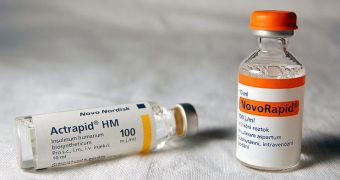Scientists have recently discovering that subjecting diabetes patients to a draconian, 600-calorie- a-day diet can actually reverse the course of the disease in these individuals. The team behind the work is however quick to point out that this does not work for every single patient.
The new work was carried out on 11 patients, who were subjected to the low-calorie diet for about a week. In 8 of these individuals, blood glucose levels returned to normal, indicating that their diabetes had gone int remissions.
The most successful of the group remained disease-free for as long as three months after they stopped the diet. Investigators from the Newcastle University, in the United Kingdom, basically demonstrated that it's possible to get rid of the disease on diet alone.
Experts here were inspired by previous researches, which showed that diabetes tends to go into remission in patients who have just had gastric bypass surgery. The researchers want to test whether an equally-fast result could be obtained on diet alone.
Limitations to this approach exist however, researchers say. Patients could experience a relapse if they return to the weight they had before the diet, explains University of Miami School of Medicine Diabetes Research Institute (DRI) professor of medicine Dr. Ronald Goldberg.
He explains that people without gastric bypass will find it extremely difficult to be satisfied with the 600-calorie diet. A bypass is surgery during which doctors remove a part of the stomach, leaving only a small compartment behind. This helps people eat less.
The diet the Newcastle University team is proposing is made up of three portions of non-starchy vegetables per day, which are accompanied by liquid meal replacement drinks. Experts say that this diet needs to be kept for 8 weeks in order to be effective.
However, after only 7 days, glucose levels dropped in patients to levels comparable to those of healthy people. Pancreas and liver fat content also decreased markedly, as the diet progressed. This continued to happen even after the diet was discontinued.
Details of the new research appear in the June 9 online issue of the medical journal Diabetologia, My Health News Daily reports.

 14 DAY TRIAL //
14 DAY TRIAL //